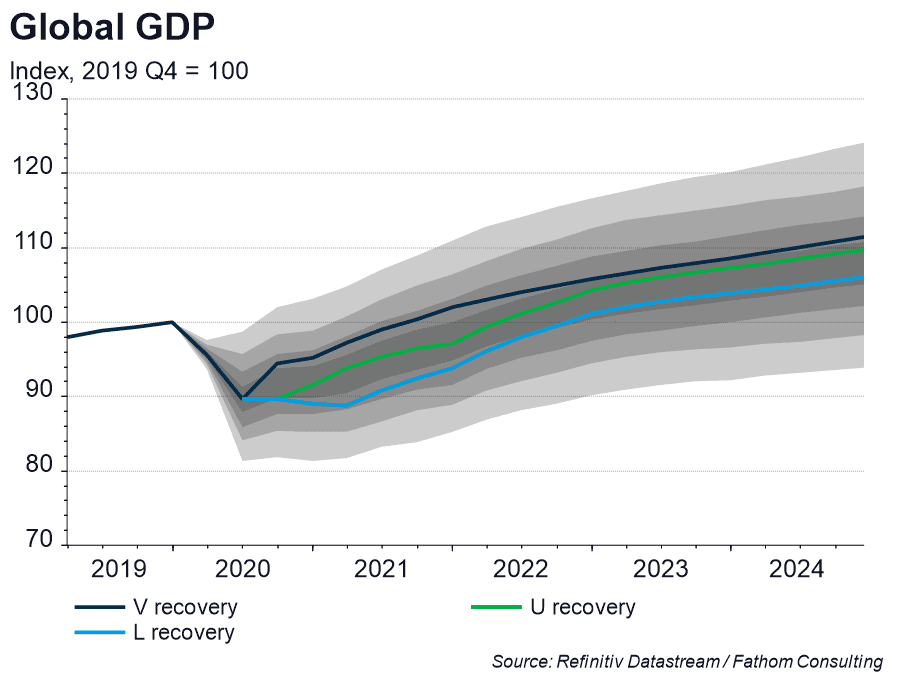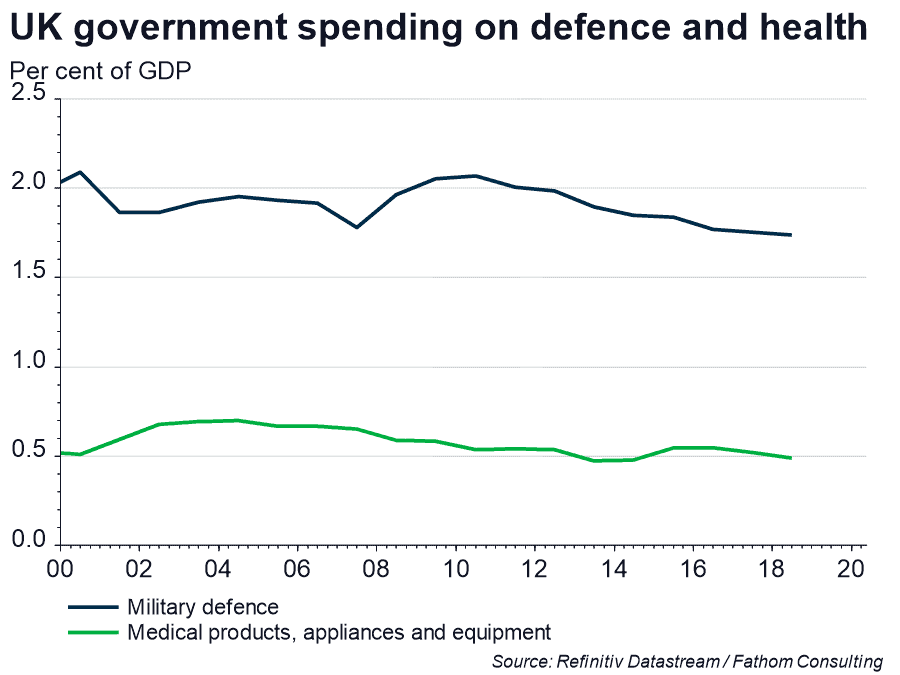A sideways look at economics
“The single biggest threat to man’s continued dominance on the planet is the virus.”
Joshua Lederberg, Nobel laureate (1988)
As COVID-19 infects virtually all aspects of our lives, it is clear the world was (and still is) severely underprepared to deal with the threat of pandemics. With human history plagued by similar catastrophic outbreaks, the coronavirus pandemic was far from unprecedented. Nor was it unpredictable. As the quotes illustrate, over the last 40 years there have been more warnings than any government would care to admit. So why were we so ill-prepared?
“If we wait for a pandemic to appear, it will be too late to prepare. And one day many lives could be needlessly lost because we failed to act today.”
George W. Bush (2005)
“The UK’s preparedness…is currently not sufficient to cope with the extreme demands of a severe pandemic that will have a nationwide impact across all sectors.”
Exercise Cygnus Report (October 2016)
“There is a shortage of medical supplies, equipment, beds, and healthcare workers as hospitals are quickly overwhelmed, with up to millions of individuals seeking outpatient medical care and millions more requiring hospitalization.”
FEMA pandemic risk assessment (July 2019)
We had both the knowledge that a severe pandemic could break out at any time and the technology to minimise the risks of one. What we didn’t have was enough funding to adequately prepare. In 2016, The Commission on a Global Health Risk Framework for the Future estimated that an annual global commitment of $4.5 billion (close to $5 billion in today’s money) would greatly reduce the threat of pandemics. To put that into perspective, that’s 0.006% of global GDP, 0.7% of the US defence budget or 3.5% of the net worth of Jeff Bezos. At Fathom, we are predicting that COVID-19 will cost the economy roughly 8% in 2020, that’s the equivalent of almost 1400 years’ worth of the Commission’s estimated funding cost.[i] Given these types of events are occurring around once every 100 years, a global annual funding of $50 billion would still more than pay off.

As globalisation continues to integrate regions on an unprecedented scale, the world becomes increasingly vulnerable to infectious disease. Defence of the realm is not something conventional armed forces can deal with alone, nor was it ever. In the 1910s, there were approximately 8.5 million combat deaths during the four years of WW1, however, in just over one year, Spanish Flu killed approximately 50 million people (some estimates go as high as 100 million). Fortunately, we now have the technology to minimise the vulnerabilities to a pandemic in our societies. Yet, whilst governments are willing to fork out hundreds of billions of dollars a year to maintain their armed forces in the name of national defence, they spend a fraction of this on preparing its defences for infectious diseases (some spend nothing at all). To some degree this is because, unlike higher military spending, which, theoretically, lowers the likelihood of you being attacked, the probability of a pandemic isn’t affected by how prepared you are. However, spending more on planning for such an event undoubtedly means more lives will be saved when one does occur. So why weren’t we prepared?
As with individuals, the life of all governments is finite (sorry, Mr Putin). Even if a political party remains in power, ministers will change, each with their own legacy to build. Because of this inescapable fact, whether it be an election loss or a revolution, the future of a policymaker is always uncertain. It is because of this uncertainty that, like all individuals, they will value the more certain today over the less certain tomorrow. The magnitude of this preference is measured by their discount factor (the amount they value future gains and losses relative to today), which will decrease as uncertainty rises. For example, as a government edges closer to an election, uncertainty over its future increases, its discount factor will drop, and it will be more incentivised to increase spending (or lower taxes) in the current period. In “new democracies”, where electoral experience, transparency and information for voters are all lacking, political budget cycles are frequent. In these countries, policymakers prefer the short-term gains of lowering taxes or increasing spending to win an election, at the expense of cuts or tax rises in the future.

Given all the information on the likelihood and risk of a pandemic, a rational individual would probably agree that preparing for one should take a larger slice of the cake than it currently does. However, we don’t always have all the information — as recently as six months ago I would have thought pandemics were things of the past. I can also think of a few individuals who I’d struggle to describe as rational! Uninformed voters, which we all are on at least a few topics, systematically vote out of line with their preferences. So, a well-informed and rational policy will not always have wide public support. To stay in power, a government must frequently choose policies that poll better over well-informed, rational ones. Funding something that will probably not pay off during their term in office at the expense of other more voter-friendly spending, like a giant wall along your country’s southern border, is hard to justify for policymakers wanting re-election, especially during budget cutbacks.
Preparing for a pandemic means deciding between a certain financial cost now and the possibility of a greater cost (human and financial) sometime in the future. High uncertainty about when a pandemic would break out, is therefore one explanation for why sufficient funding was not in place pre-COVID-19. However, given the amount of warnings policymakers had, many of which have recently come to light, it seems policymakers have an innately low discount factor and therefore have a strong preference for the short term. Hence, it could be said (and I’m sure this won’t meet much resistance) that governments would rather do what looks best for the country over the course of their term rather than what is genuinely best for the country in the long run. They would rather gamble on such events not happening on their watch, effectively throwing the hot potato to the next administration.
It is likely that, with the memory of COVID-19 fresh in their minds, in the coming years governments will dig deep to prepare for future outbreaks. As found by Tversky and Kahneman in 1973, most individuals tend to overestimate the likelihood of a certain class of event happening the more easily a previous instance comes to mind. The availability heuristic, as they refer to it, is affected by many things, including how recent and emotional relevant past examples are. As a result of this overestimation, future policymakers will perceive the probability of a pandemic happening during their time in office as being higher and we should, hopefully, see increased funding going towards preparations. However, with time, the ease with which our minds recall the COVID-19 pandemic will fade (assuming pandemics don’t start occurring more frequently) and consequently the effects of the availability heuristic will fade with it. Perhaps someone will end up writing a very similar blog 100 years down the line!
With the rise of social networking and mass media comes increased transparency and accountability in politics. But has this further focused policymakers’ sights on the short term as they delicately manage responses to the week’s trending news stories to avoid any PR backlash? To help minimise these conflicts of interest, other public offices have significantly longer term lengths. The Governor of the Bank of England can potentially stay in office for 16 years and, once appointed, a US supreme court justice can remain on the bench for life. Would longer term limits help governments serve their citizens more effectively in the long run and better prepare the country for crisis like this one? In my opinion, no. Firstly, no country has emerged from this pandemic well enough to declare their response and preparations adequate, regardless of their form of government. Secondly, and more importantly, without the sword of accountability hanging over the government, through frequent and fair elections, the priority of policymakers would change from how to appeal to voters to how to cling onto power. If President Putin gets his way, he will be able to extend the length of his leadership to almost 40 years, yet the country has one of the highest numbers of COVID-19 cases.
Perhaps, failing to deal with issues that require commitments longer than an elected official’s term limit is the cost of having accountability in politics. But what if we took these issues out of the remit of publicly elected officials? These time-inconsistencies in public policy led to the Bank of England’s independence in setting interest rates to achieve the governments’ inflation target. Unburdened by elections, an independent and specialised body tasked by the government to prepare for a pandemic should, in theory, ensure that funding is adequately sustained in the steady state and not only when it is too late. Surely this system should be applied to all policy decisions that are susceptible to these inconsistencies. As Churchill once said, “democracy is the worst form of government except for all those other forms that have been tried from time to time”. Well, maybe it’s time we took democracy out of the aspects of governance where it performs worst.
[i] This hit to the economy incorporates a 5% fall in output plus the loss in growth we would otherwise have had.